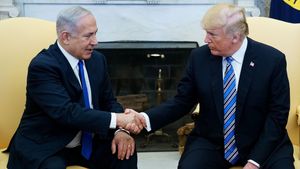Forbes has released its 2025 list of the most powerful countries, and the results have sparked considerable debate, particularly around India's position. Topping the list is the United States, followed closely by China, with India surprisingly absent from the top ten. Ranked 12th, India’s omission has raised eyebrows considering it is the world’s most populous country, boasts the fourth-largest military, and is the fifth-largest economy.
The methodology for the Forbes ranking was developed by the BAV Group and led by Professor David Reibstein from the Wharton School at the University of Pennsylvania, working alongside US News & World Report. This ranking is increasingly significant, as these countries not only dominate headlines but also influence global economic trends and political agendas.
According to US News, “The world’s most powerful countries are the ones who consistently dominate news headlines, preoccupy policymakers, and shape global economic patterns.” The report emphasizes the influence these nations project on the world stage, driven by their foreign policy commitments and military budgets. The criteria used to create the ranking include leadership, economic influence, political power, strong international alliances, and military strength.
The Forbes top ten list is as follows:
- 1. United States: GDP of $30.34 trillion, population of 345 million.
- 2. China: GDP of $19.53 trillion, population of 1.419 billion.
- 3. Russia: GDP of $2.2 trillion, population of 144 million.
- 4. United Kingdom: GDP of $3.73 trillion, population of 69 million.
- 5. Germany: GDP of $4.92 trillion, population of 84 million.
- 6. South Korea: GDP of $1.95 trillion, population of 52 million.
- 7. France: GDP of $3.28 trillion, population of 66 million.
- 8. Japan: GDP of $4.39 trillion, population of 123 million.
- 9. Saudi Arabia: GDP of $1.14 trillion, population of 34 million.
- 10. Israel: GDP of $550.91 billion, population of approximately 9.38 million.
This ranking is significant for India, which has managed to climb its way to being the fifth-largest economy, positioned just behind the US, China, Germany, and Japan. The nation holds remarkable economic conditions and has developed strong international alliances and military capabilities. Yet, the failure to make the top ten prompts inquiry about the metrics used—especially when one considers India’s considerable military and diplomatic activity on the global stage.
The report suggests pathways for India to improve its rankings. Factors such as enhancing its international alliances, improving political influence, and increasing its economic presence could be key areas of focus. Some analysts argue India's military expenditures and global strategic commitments need to be comparable to those of the higher-ranking countries to boost its standing.
India’s exclusion from the list, as well as its 12th-place position, can be perceived as both a challenge and an opportunity. The fact remains, as the global geopolitical climate evolves, nations like India must navigate effectively to carve out more influence and power.
While reflecting on India’s current standing, reports highlight its GDP per capita stands at $10,176, and the total GDP is $3.55 trillion, within significant population constraints of 1,428,627,663 and covering the vast geographical area of 3,287,263 sq. km. The rankings underlines the shifting dynamics of international power and exposes the nuanced competition between geopolitical entities worldwide.
The 2025 rankings herald not just a measurement of power, but they pose broader questions about what influence means and how countries can assert themselves on the world stage. The absence of India from the top ten is more than just statistical; it is emblematic of the challenges it faces going forward.
Looking forward, discussions among national policymakers, military strategists, and economic leaders will likely intensify as they seek to either reinforce their current standings or strive to break through the barriers presented by the existing ranks.
The significant ranking highlights the importance of addressing gaps, reassessing strategies, and fostering partnerships to redefine power globally.



